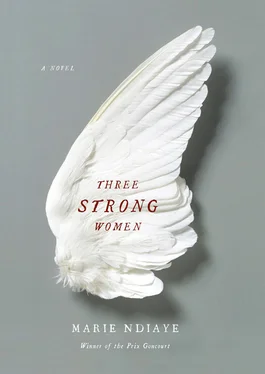How accommodating and sadly devious this gentle, benumbed woman had shown herself to be in her distress! She’d gone on buying clothes for Sony, folding them carefully, and putting them away in the little boy’s chest of drawers.
“For when he gets back,” she’d say.
But from the outset Norah and her sister had been fully aware that Sony would never come back, knowing as they did their father’s lack of feeling, his indifference to the feelings of others, and his penchant for imposing his iron will on those around him.
Once he’d decided that Sony was his by right he would ignore everything that could restrain his desire to have his only son at his side.
He considered of little importance the unhappiness that Sony felt about his exile, just as he viewed the suffering of his wife as unavoidable and purely temporary. For he was like that: implacable and terrifying.
Throughout the time their mother still expected Sony to return, Norah and her sister knew that she hadn’t gotten the full measure of her husband’s intransigence. He would stubbornly refuse, for instance, to send the boy back to France for the holidays.
For he was like that: an implacable, terrifying man.
The years passed and the painful subservience of their mother was rewarded only by an invitation to Norah and her sister to visit their brother.
“Why won’t you let Sony come and see us?” their mother shouted into the phone, her face contorted in grief.
“Because I know that you wouldn’t let him go again,” their father, calm and self-assured, probably answered, slightly annoyed perhaps because he loathed weeping and shouting.
“Of course I would, I swear to you!”
But he knew she was lying, and she knew it too. Choking and gasping, she couldn’t go on.
That their father would never want to be burdened with his two daughters, that he’d do nothing to keep them, was so blindingly obvious that their mother let them go to see him, sending Norah and her sister as emissaries and witnesses to her immense affliction, to her somewhat disembodied love for a boy whose photograph his father from time to time sent to her, a badly taken picture, always blurred, which invariably showed Sony smiling broadly, in excellent health, amazingly handsome, and expensively dressed.
Their father had acquired a holiday village while it was still under construction. He’d given it a complete, luxurious makeover, and it was now making him a wealthy man.
Meanwhile, in Paris, in a symmetrical but contrary manner, as if she felt she had to atone for her misfortune by letting things slide, their mother was experiencing money troubles. She kept getting into debt and having to negotiate endlessly with credit card companies.
Their father sent a little money at irregular intervals, different amounts each time, doubtless because he wished to convey the impression that he was doing all he could.
He was like that, implacable and terrifying.
He was incapable of compassion and remorse, and because as a child he’d been tormented by hunger on a daily basis, he was determined now to gorge himself and apply his quick intelligence to no aim but ensuring his comfort and establishing his power. He had no need to tell himself, “I deserve all this,” because he never doubted for a second that his privileges and the wealth amassed so quickly were his by right.
Meanwhile their conscientious, desperate, insecure mother was getting into a mess with her accounts. Eventually, that meant she had to move. In the rue des Pyrénées they took a two-bedroom apartment that looked onto an inner courtyard. Sony’s drawer was stocked with fewer and fewer new clothes.
So when the two girls, aged twelve and thirteen, arrived for the first time in their father’s enormous house, stricken with emotion and exhausted by the heat, they brought with them the decorous, austere, repressed sadness in which they lived, a sentiment betrayed by their short, simple haircuts, their denim dresses bought too big so as to last longer, and their graceless missionary sandals. It all aroused an overwhelming feeling of disgust in their father, made only worse by the fact that they were neither of them very pretty, as well as suffering from acne and being overweight. As they grew older they shed the extra pounds, but they would always, in a way, look fat to their father, because he was like that: a man deeply shocked and repelled by ugliness.
That’s why, Norah thought, he’d loved Sony as much as he could love anyone.
Their younger brother appeared on the threshold of the house. He hadn’t dropped from the poinciana, then still a small and delicate shrub, but had just dismounted from a pony on which he’d been slowly trotting around the garden.
Dressed in a cream-colored riding outfit and wearing real riding boots, he stood with one foot forward, his riding hat tucked under his arm.
No smell of rotting flowers clung to his lithe, elegant frame. The nine-year-old boy’s narrow chest was not lit from within by any unusual glow.
He was simply there, smiling, happy, and magnificent, stretching his arms out to his sisters, as dazzling and carefree as they were dull and serious.
And Sony treated them with extreme unpretentious kindness throughout their stay, during which, though scared and reproachful, they tasted a life of luxury beyond their wildest imaginings.
He greeted every remark they made, every question they asked, with a gentle smile and a few noncommittal words, making a joke of it, so they failed to notice that they never got a straight response to anything.
He remained silent whenever they mentioned their mother.
He gazed into space and his lower lip quivered slightly.
But it didn’t last; he quickly became once again the happy, calm, unpretentious, smooth-skinned, almost too gentle boy whom their father would gaze at proudly, obviously comparing him with his two lumpish anxious-looking daughters and telling himself — Norah supposed — that he’d done right in not leaving Sony behind, in removing him from his mother’s baleful influence, which had transformed two amiable little girls into a pair of tubby nuns, particularly since the beautiful woman with the scornful expression and slightly bulging eyes whom he’d married two or three years earlier and who wandered the property silently with a weary, irritated, melancholy, and intimidating air, had yet to give him a child and never would.
When at the end of three weeks Norah and her sister returned home they were actually relieved to escape a way of life that their loyalty to their mother made them feel duty bound to condemn (“Mummy has money troubles,” they’d found the courage to tell their father on learning that Sony was being sent to a prestigious private school, to which he’d responded with a sigh, “My poor dear girls, who doesn’t have money troubles!”). They were also deeply saddened to be leaving Sony behind.
Standing on the threshold with one foot in front of the other, dressed this time in his basketball uniform, his ball under his arm, and making every effort to smile, Sony had said good-bye, his lower lip trembling slightly, but otherwise maintaining the kind, inscrutably smooth, and submissive air he’d shown throughout.
Their father was there too, standing up straight beneath the scanty foliage of the young poinciana, looking elegant, his narrow hips turned slightly away.
He’d laid a hand on Sony’s shoulder, at which the boy had seemed to cringe, almost as if doubling over, greatly surprising Norah, who had thought, He’s afraid of him, but then, before getting into the car to be driven away by Mansour, rejecting the idea, since it bore no relation to anything she’d seen during their stay.
Because their father, that terrifying, unbending man, had always treated Sony with great kindness.
Читать дальше












